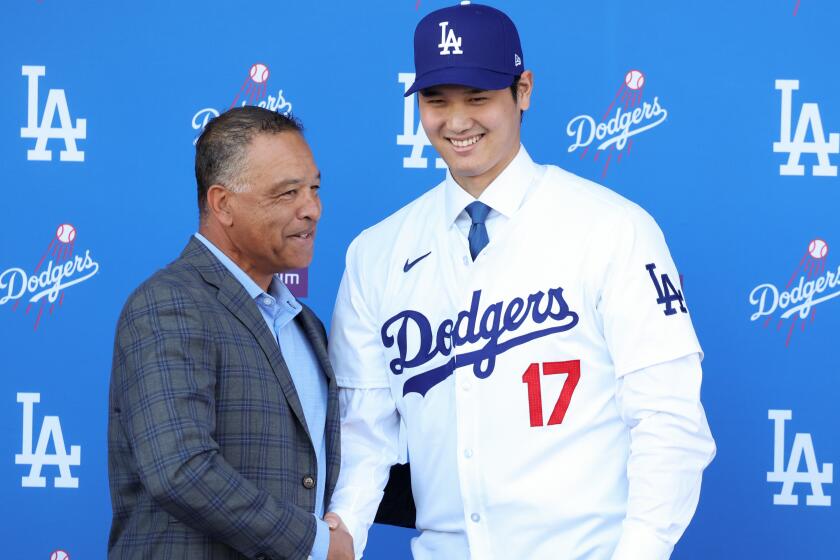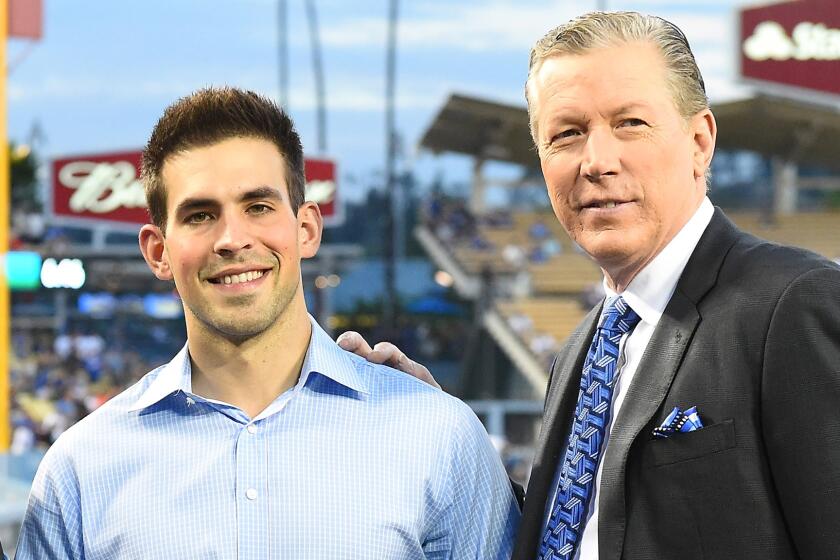Lawyer finds himself in middle of McCourts’ drama
The dispute over who owns the Dodgers may turn on one word. It is the 12th word of the second paragraph of the first exhibit of an agreement signed by Frank and Jamie McCourt six years ago.
If that word is “inclusive,” Frank could be the sole owner of the Dodgers. If that word is “exclusive,” Jamie could be the co-owner.
Three copies of the agreement say “inclusive.” Three copies say “exclusive.” Frank and Jamie have both said they were not aware of the different wording until this year.
The difference in the words: two letters, and perhaps hundreds of millions of dollars.
That makes the lawyer who drafted the agreement, Larry Silverstein, a pivotal figure in the McCourt divorce trial. Silverstein and his firm could face a nine-figure liability claim should the losing McCourt blame him, according to several legal experts contacted by The Times.
“His competence is being challenged here,” said Laurie Levenson, a Loyola Law School professor and legal commentator. “If he’s shown to be incompetent at the trial, the next action could be malpractice.”
The divorce trial resumes Monday in Los Angeles Superior Court, with Jamie on the witness stand. Silverstein is tentatively scheduled to testify Tuesday.
Silverstein is a graduate of Harvard Law School and a partner at Bingham McCutchen, a powerhouse firm employing 1,100 attorneys in the United States, Europe and Asia. He focuses on “tax, corporate and real estate planning,” according to the Bingham website.
The two primary questions for Silverstein: How does he explain the conflicting language in the various copies of the agreement, and why did he apparently substitute one version for another without notifying his clients of the discrepancy?
“The lawyer will have to explain why he would unilaterally change a document without getting everyone’s permission,” said Andrew Waxler, whose El Segundo firm specializes in representing defendants in legal malpractice cases.
Frank McCourt’s lawyers have said Silverstein simply made a drafting error and corrected it. In his testimony, Frank said Silverstein did not materially change the agreement by substituting an exhibit that read “inclusive” for one that read “exclusive” after the parties had signed the document.
Frank testified Silverstein should have informed the McCourts of the switch as a courtesy, but he also testified the body of the agreement made clear the Dodgers would be his sole property, as he said the parties intended at the time.
“If it was correcting a mistake, it was the right thing to do,” Frank testified.
If Los Angeles Superior Court Judge Scott Gordon invalidates the agreement, Frank would have “a stupendous legal malpractice claim” against Silverstein and his firm, said Michael Dempsey, whose Century City firm specializes in representing plaintiffs in legal malpractice cases.
Jamie’s attorneys have argued the conflicting language is critical to the agreement and reason enough to throw it out. If Gordon rules that Frank and Jamie are co-owners of the Dodgers, Dempsey said, Frank could sue Bingham for the value of half the team — most likely hundreds of millions of dollars.
However, Waxler said, the strength of any case would depend upon the reasoning Gordon cites in his ruling.
“The client has to prove, but for the specific error, a different result would have occurred,” Waxler said. “If there are five reasons the agreement was thrown out and one of them was the lawyer’s error, they’re not going to face civil liability.”
Jamie has testified that the notion she would have surrendered her right to the Dodgers in any agreement was “preposterous.” In court papers, her lawyers note that Silverstein excluded the team from Frank’s separate property after discussing a draft agreement with her. That could compel Silverstein to explain why he reversed the language after speaking with Frank.
If Frank can establish he never would have agreed the Dodgers would be community property and Jamie can establish she never would have agreed the Dodgers would be Frank’s sole property, that could help absolve Silverstein of liability.
“It’s not enough that the lawyer messed up,” said Mark Helm of the Los Angeles firm Munger, Tolles and Olson. “If you can’t get the other side to agree to your terms, that’s not the lawyer’s problem.”
Experts say that Silverstein proceeding with the agreement raises two other potential problems for his firm.
The first involves the possible conflict of interest in representing two parties surrendering property rights to one another.
Leah Bishop, an estate planning attorney who worked with the McCourts, testified that she chided Silverstein in 2008 for not ensuring Frank and Jamie had a separate lawyer in negotiating the agreement. According to Jamie’s attorneys, Bingham “flagrantly chose to protect the interest of Frank over Jamie’s interests.”
The second potential problem involves the claim, made by Frank’s attorneys, that Silverstein prepared extra copies of the agreement on the night before the McCourts signed the documents, so three could be signed in their former home state of Massachusetts and three more in California “just in case the place of execution made a difference.”
Said Dempsey: “The lawyer should have known before signing day whether there was an issue.”
Levenson said she would not be surprised if the losing McCourt filed a malpractice claim.
“Do losing clients sue their lawyers, blaming them for the problem?” Levenson said. “All the time.”
bill.shaikin@latimes.com
More to Read
Are you a true-blue fan?
Get our Dodgers Dugout newsletter for insights, news and much more.
You may occasionally receive promotional content from the Los Angeles Times.







